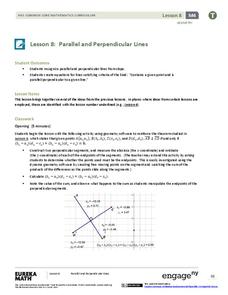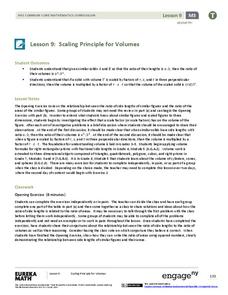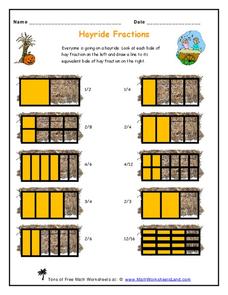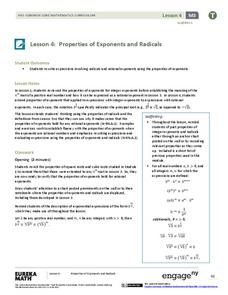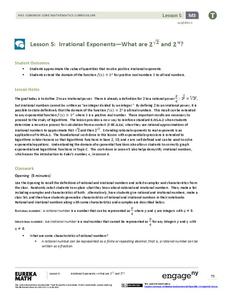Teacher Treasures
Class Credit Cards
Give children credit where credit is due with this classroom management system. Providing each student with their very own charge card, they are able to gain credit for being respectful and responsible and...
Center for Mathematics and Technology
Whole Numbers: Using an Area Model to Explain Multiplication
There are many ways to work through a multiplication problem. Using an area model, kids complete several worksheets with different types of multiplication problems, including multiplying by ten, and explain how the new strategies differ...
Curated OER
Rational Number Project
Infuse your unit on fractions, decimals, and operations with a thorough module about rational numbers. With a teaching guide, learner examples, templates for instruction, and lesson rationale, the module is a solid way to...
Common Core Sheets
Finding Area
Practice makes proficient! Here, 10 versions make up an area worksheet in which mathematicians find the area rectangles and squares in centimeters.
EngageNY
Parallel and Perpendicular Lines
Use what you know about parallel and perpendicular lines to write equations! Learners take an equation of a line and write an equation of a line that is parallel or perpendicular using slope criteria. They then solve problems to...
EngageNY
Using Expected Values to Compare Strategies
Discover how mathematics can be useful in comparing strategies. Scholars develop probability distributions for situations and calculate expected value. They use their results to identify the best strategy for the situation.
World Wildlife Fund
Arctic Shapes
In a two-part worksheet, young geometers examine 3-D shapes and describe their attributes in a table. They will be able to draw the shape and name the number of vertices, faces, and edges. In the second part, individuals explore...
Houghton Mifflin Harcourt
Multiplication Properties and Division Rules
Practice multiplication and division with a worksheet about multiplication properties. After reviewing the commutative property, identity property, zero property, and associative property, kids solve ten multiplication and division...
Math 4 Children
Perimeter and Area
Use the measurements provided on nine different triangles to find the perimeter and area for each. All measurements are in centimeters, making the worksheet simple and straightforward for learners of all levels.
Common Core Sheets
Determining Coordinates: All Positive Coordinates
Take the numbers out of graphing with an activity about finding positive coordinates. Kids find each symbol or letter at various places on the grid, then note their coordinates in the space provided.
MENSA Education & Research Foundation
Pi Day Fun!
In this multi-faceted introduction to pi, participants perform a bevy of pi-related activities. Ranging from measuring household items to singing pi songs and reading pi stories, this fun and non-intimidating resource serves to bring up...
Common Core Sheets
Adding and Subtracting Percents and Decimals
Seventh graders are challenged to find the sums and differences of percents and decimals. But first, pupils must find the value of the percent in order to add/subtract it from the decimal.
EngageNY
Modeling Relationships with a Line
What linear equation will fit this data, and how close is it? Through discussion and partner work, young mathematicians learn the procedure to determine a regression line in order to make predictions from the data.
EngageNY
Scaling Principle for Volumes
Review the principles of scaling areas and draws a comparison to scaling volumes with a third dimensional measurement. The exercises continue with what happens to the volume if the dimensions are not multiplied by the same...
K5 Learning
Mixed Practice Word Problems #7
Five questions make up a mixed practice worksheet. Pupils use their skills in addition, subtraction, and multiplication to answer word problems consisting of numbers up to 130.
K5 Learning
Mixed Practice Word Problems #12
Five questions make up a mixed practice worksheet consisting of word problems that cover subtraction, multiplication, pounds, and distance.
Math Worksheets Land
Hayride Fractions
Ten bales of hay divided into equal parts. Which two bales of hay are equivalent to each other? Here, young mathematicians match equivalent bale of hay fractions to one another.
EngageNY
Properties of Exponents and Radicals
(vegetable)^(1/2) = root vegetable? The fourth installment of a 35-part module has scholars extend properties of exponents to rational exponents to solve problems. Individuals use these properties to rewrite radical expressions in...
EngageNY
Irrational Exponents—What are 2^√2 and 2^π?
Extend the concept of exponents to irrational numbers. In the fifth installment of a 35-part module, individuals use calculators and rational exponents to estimate the values of 2^(sqrt(2)) and 2^(pi). The final goal is to show that the...
EngageNY
The “WhatPower” Function
The Function That Shall Not Be Named? The eighth installment of a 35-part module uses a WhatPower function to introduce scholars to the concept of a logarithmic function without actually naming the function. Once pupils are...
EngageNY
Building Logarithmic Tables
Thank goodness we have calculators to compute logarithms. Pupils use calculators to create logarithmic tables to estimate values and use these tables to discover patterns (properties). The second half of the lesson has scholars use given...
EngageNY
Changing the Base
I can't calculate a base-2 logarithm since my calculator doesn't have a base-2 log key. Young mathematicians use the change of base formula to extend the properties of logarithms to all bases. Among these bases is the natural log base,...
EngageNY
Solving Exponential Equations
Use the resource to teach methods for solving exponential equations. Scholars solve exponential equations using logarithms in the twenty-fifth installment of a 35-part module. Equations of the form ab^(ct) = d and f(x) = g(x) are...
EngageNY
Percent Rate of Change
If mathematicians know the secret to compound interest, why aren't more of them rich? Young mathematicians explore compound interest with exponential functions in the twenty-seventh installment of a 35-part module. They calculate future...
Other popular searches
- Math Homework
- Math Homework Help
- First Grade Math Homework
- Math Homework Rubric
- Math Homework Help Range
- 4th Grade Math Homework
- Math Homework Sheets
- Math Homework Assignments
- Help on Math Homework
- Halloween Math Homework
- Maths Homework






